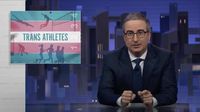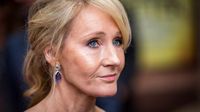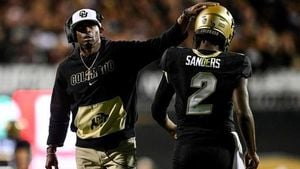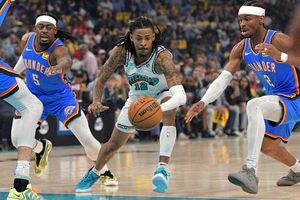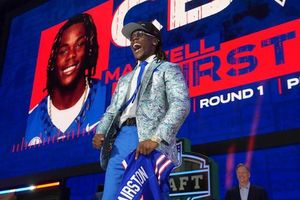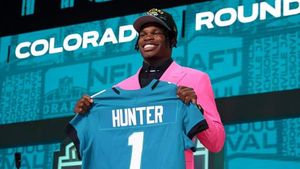In a renewed clash over transgender athletes in women's sports, John Oliver has once again sparked the ire of J.K. Rowling, the famed author of the Harry Potter series. During a recent episode of HBO's Last Week Tonight, Oliver criticized the ongoing push from some conservative factions to ban transgender women from competing in female sports, stating that their "obsession" with this issue lacks any substantial basis in research.
Oliver's segment reignited the feud between him and Rowling that began last November. The comedian pointed out that there is a significant lack of evidence regarding how being transgender or undergoing gender-affirming treatment affects athletic performance in teenagers. He stated, "We have no research about how being trans or undergoing gender-affirming treatment impacts athletic performance in teens," highlighting the need for a more nuanced discussion on the topic.
Rowling, known for her controversial views on gender issues, took to social media shortly after the segment aired to criticize Oliver. She labeled him as someone whose views are "fashionably anti-women," implying that his stance is not only misguided but also detrimental to women's rights. Rowling wrote, "I understand why men like Oliver, who've consistently mocked anti-science people on the right, sold out initially. They didn't want to blow up their careers. Taking fashionable anti-women's rights positions was the cost of doing business. But it's time to read the f***ing room." This comment reflects her ongoing battle with the perception of her views as anti-trans.
In response, Oliver humorously remarked about the absurdity of receiving backlash from Rowling, joking about how it felt "a bit weird to catch that much heat from the creator of ‘Harry Potter,’ especially when I clearly look like what would have happened to him if they left him in that cupboard for the rest of his life."
Oliver's defense of transgender athletes is grounded in the argument that the physical advantages often attributed to male athletes do not universally apply in every sport. He explained that while biological differences exist, they do not inherently confer an advantage in all athletic contexts. For example, he noted that having a physique suited for strength sports does not translate to success in activities like ballet. He stated, "In general, there's a lot of overlap in the average performance ranges of men and women. Basically, it's not the case that any man is going to be stronger or more athletic than every woman, which is sometimes what gets implied here."
Moreover, Oliver emphasized that trans kids, like all children, vary in their athletic abilities and should be allowed to participate in sports for enjoyment rather than facing undue scrutiny. He said, "Trans kids, like all kids, vary in terms of athletic ability, and there is no evidence they pose any threat to safety or fairness." This perspective highlights the importance of inclusion and the right to play.
In the wake of the segment, Rowling's response has reignited discussions about her previous criticisms of trans rights and the broader implications of her views. Critics argue that her rhetoric fuels anti-trans sentiment and contributes to a hostile environment for transgender individuals. Oliver's segment was not just a defense of trans athletes but also a critique of the political landscape that often weaponizes these discussions for ideological gain.
As the debate continues, both Oliver and Rowling find themselves at the forefront of a contentious issue that has polarized public opinion. Oliver's show, which is now in its twelfth season, has gained a reputation for tackling complex social issues with a blend of humor and research. It has won 30 Primetime Emmy Awards, reflecting its impact and popularity.
Looking ahead, the timing of this feud is particularly noteworthy, as HBO is set to adapt Rowling's Harry Potter novels into a new series, which is scheduled to begin airing in 2026. The potential for conflict between Oliver's show and Rowling's production raises questions about how their ongoing disagreements could affect the future of both projects.
As the conversation around transgender athletes continues to evolve, it remains clear that figures like Oliver and Rowling will play significant roles in shaping public discourse. With both sides entrenched in their views, the debate is likely to persist, drawing in more voices from various corners of society.
In the end, the clash between John Oliver and J.K. Rowling serves as a microcosm of the larger societal struggle over transgender rights and representation in sports. As both public figures navigate their respective platforms, the implications of their arguments will resonate far beyond the realm of entertainment, influencing how society views and treats transgender individuals.
